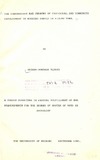| dc.description.abstract | This thesis addresses the issue of housing for low-income urban workers in Kenya, with particular reference
to Kisumu town. The purpose of the study was to "Examine the socio-economic factors constraining the low-income urban workers from participating in the supply of urban housing". In addition, the study examined the effectiveness of self-help approach in housing as a means of helping the urban poor satisfy their basic housing needs. The theoretical analysis focuses on and describes the political economy and community development approaches to the solution of the housing problem. The framework of analysis evolves around self-help activities and the socio-economic constraints that impinge on the ability of low-income urban workers to participate in the supply of urban housing. Using a multi-stage area sampling, a total of 241 respondents were interviewed in Manyatta, Migosi, and Nubian Village residential areas, respectively, using scheduled standardised questionnaire in which the working order of all questions were exactly the same for every respondent. A case study of the self-help groups and their activities was also conducted in the above areas. The study reveals that the major factor constraining :low-income urban workers from participating in self-help urban housing is lack of or inadequate means. This, according to the findings, is further worsened by insufficient supply of housing opportunities to motivate involvement, and lack of urban commitment resulting in psychological disincentive to people's investment in urban housing. From a case study on self-help groups, the findings reveal that self-help housing is loosely understood in the low-income areas of Kisumu. consequently, there are a number of self-help groups but neither of them has housing as its dominant activity. Almost all the self-help groups, mostly women's groups are involved in income generating activities. One of the main conclusions of this study is that the self-help approach to housing through the site and service i projects, is grossly inadequate to free the housing shortage. In addition, the study concludes that self-help housing cannot be a viable way of alleviating the housing problem for low-income urban workers, without the provision of sufficient opportunities, and adequate financial assistance to motivate participation. It has been recommended therefore that in order to motivate the participation of low-income groups in housing supply:
(a) complete socio-ecqnomic development should be the ultimate aim of low-cost popular housing, to enable
the low-income groups become more self-reliant and confident.
(b) community development in urban housing should aim at creating self-help attitude among the urban poor by giving them the freedom to build, in addition to socialising them to understand the importance of urban
housing investment.
(c) co-operative housing among the low-income urban workers should be encouraged and and given priority
in future housing developments.
(d) ready-made housing units, affordable to the low-income urban workers, should be developed alongside site and service schemes.
(e) income generating self-help activities provide the basis upon which self-help housing can be motivated,
and should be encouraged, as a means of raising the income levels of the urban poor, upto a point when
they will be ready to participate. | en |

